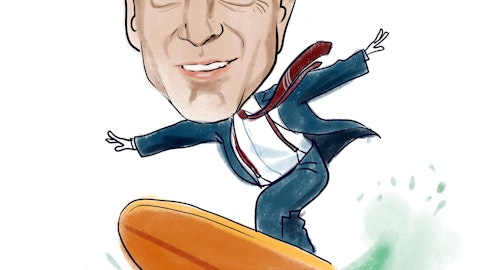Investors might have seen this story before in Sears
If Loeb is involved in Yahoo simply to strip and liquidate the company’s assets, it wouldn’t be unfair to compare the move to one undertaken by another hedge fund manager: Eddie Lampert.
Lampert took control of Sears Corporation in 2005, merging it with Kmart to form Sears Holdings Corporation (NASDAQ:SHLD). Rather than work to create a formidable retail chain to challenge the likes of Wal-Mart or J.C. Penney, many believe that Lampert viewed the investment as a play on the company’s underlying real estate holdings and its iconic brands like Craftsman.
But even if that’s the case, it hasn’t worked out well for the company’s investors. Shares of Sears peaked in 2007 just shy of $200. Since then, shares have never exceeded $130. On Tuesday, Sears shares closed at $47.37.
Of course, Sears and Yahoo operate in very different worlds: Yahoo is an Internet giant, Sears is a retail chain. But the fundmanetal comparison, that of two has-been companies being stripped of assets to satisfy hedge fund managers, remains.
Bulls might argue that AOL is a better comparison
A more favorable comparison for Yahoo bulls is that of AOL, Inc. (NYSE:AOL).
CEO Tim Armstrong (coincidently also of Google origin) took over the once dominant Internet service provider in March of 2009. He sought to remake AOL as a digital media company, and in the process, he sold off a number of assets for billions of dollars. These included the sale of Bebo, and most recently, a patent deal with Microsoft that raised $1.056 billion.
The cash from the sale of those patents was returned to shareholders through a special dividend and $600 million stock repurchase program.
Yet, Armstrong’s time at AOL hasn’t wholly been about asset sales: Armstrong has purchased a number of companies as well, most notably The Huffington Post, bought for a cool $315 million.
But if Loeb is in Yahoo just to sell assets, there are still more that can be sold
Maybe Loeb will stick around past Yahoo’s current buyback. Yahoo still owns 23% of Alibaba, of which Alibaba itself has the right to purchase half of that stake before an IPO. Yahoo can then sell its remaining shares once Alibaba begins trading.
Depending on how Alibaba is valued, that could net Yahoo billions — money which could be returned to shareholders.
There’s also Yahoo’s Japanese cousin, Yahoo Japan. Yahoo America owns 35% of that, which if sold off, could bring in billions more. Again, more money for shareholders and possibly for Loeb.
Yet, lost in the shuffle is Yahoo’s core business. If Mayer cannot get her hands on that cash, she may be hamstrung in what she can do to build Yahoo itself. In the end, if investors come to see Loeb’s Yahoo involvement as nothing more than a cash grab, upside may be limited.
Perhaps that is why Loeb is cutting back.
The article Why is Dan Loeb Cutting His Yahoo Stake? originally appeared on Fool.com and is written by Salvatore “Sam” Mattera.
Copyright © 1995 – 2013 The Motley Fool, LLC. All rights reserved. The Motley Fool has a disclosure policy.




